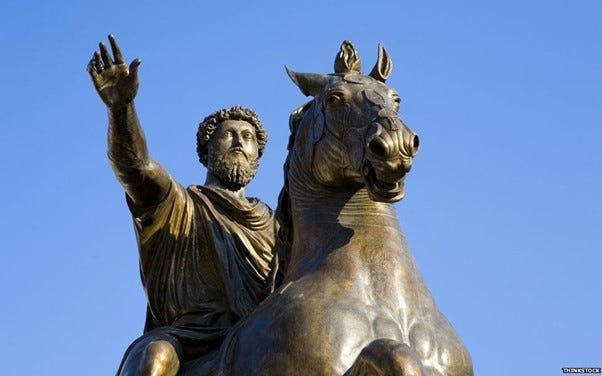Dear Classical Wisdom Reader,
You may notice that this week’s Monday mailing is a bit late.... It’s past midday and ahem, Tuesday.
I’ve been very preoccupied with the unforeseen and the unpredictable realities of life. When our fulfillment company opened the very last case of Essential Classics books, the beautiful hardback anthologies we had made available for the holidays were ruined, destroyed in storage or in transit, and unsuitable to sit on any shelf.
The ravages of time come for us all... even the printed word!
Such an occurrence for a small company like us is, as you can imagine, not desirable. I believe the technical term is a ‘gut-punch’. After desperately searching for more copies and investigating whether we can re-print them in time, I had to make a decision. With a heavy heart and a saddened sense of obligation, I’ve spent the last several hours today writing personally to every single customer who was affected to refund them.
Please note: the majority of books have already been sent! So if you already have your tracking number and you haven’t heard from me, don’t worry, your book is on its way.
Fortunately, I have in this community wonderful, thoughtful and considerate folks who have been understanding and patient with the situation.
I also had a good opportunity to put philosophy in action. It’s easy enough to write about the wisdom of the past, it’s another to actually employ it! And who better than the Stoics to come to one’s aid in a moment of frustration...
Most applicable of all is the lesson of being able to delineate what is in your control versus what is not. We then need to apply the appropriate response to situations that we can affect and let go in circumstances which are beyond our control. I can not make damaged books undamaged, but I can let my customers know in enough time to find alternative plans for the holidays.
Of course, it’s a time of year when many of us face difficulties and complications, like navigating family issues, managing financial demands or finding the time to take care of yourself… Fortunately, there is a wealth of wisdom and insights that can come to our aid from the ancients.
So today we’ll go back to the roots of Stoicism for all those who may benefit from a little dose of philosophical perspective during this silly season, your dear editor included!
Please enjoy this guest column by William B. Irvine, Professor of Philosophy, Wright State University, on putting the Greek back into Stoicism.
All the best,
Anya Leonard
Founder and Director
Classical Wisdom
P.S. Happy Saturnalia! The “Best of Days” has begun... A precursor to Christmas, this Roman holiday was the talk of the town and its legacy immense! We’ll discuss it further in our Member’s issue on “Celebrations!” coming out tomorrow.
Not a Member? Join our growing community to support the Classics and enjoy the wisdom of the past.
Putting the Greek Back into Stoicism
by William B. Irvine, Professor of Philosophy, Wright State University
It was the Greeks who gave us the word “crisis”. It is derived from the Greek krinein, meaning “decide”. Besides giving us our word for crisis, the Greeks also provided us with a splendid strategy for dealing with crises: the philosophy known as Stoicism.
Contrary to popular belief, Stoicism does not advocate that we keep a stiff upper lip – that we stand there mutely and impassively, and take whatever the world throws at us. It instead provides us with a number of specific strategies which, if practised, can make our days go better, in both good times and bad.
One component of the Stoic strategy is to distinguish between things we can control and things we can’t. Our life, say the Stoics, will be miserable if we spend our time worrying about things over which we have no control. That time and energy is far better spent thinking about things we can affect. To quote Roman Stoic Marcus Aurelius, “Nothing is worth doing pointlessly.”
One of the things we have no control over is the past. We cannot alter it. We therefore need to decide whether we are going to spend our life filled with regret over choices we have made in the past, or whether we are going to let go of that past and instead focus our attention on the choices that lie ahead. It ought to be an easy decision to make. It is also a decision that many people, tragically, fail to make.
The Stoics have a simple technique for making our days go better: we should think about how they could have been worse. Notice that I didn’t say dwell on how they could have been worse; that would be a recipe for a miserable existence. Instead, we should allow ourselves to entertain flickering thoughts about the loss of our friends, money, lover, job, health – all the things we value.
If we do lose any of these things, we will have been prepared by our negative thinking, and this will likely lessen the blow of our loss; we will, in a sense, have seen it coming. And if we don’t lose these things, we will find ourselves far more appreciative of them than would otherwise have been the case.
A life filled with people and things that we appreciate is easy to enjoy. The Stoics were smart enough to realise that we have it in our power to appreciate the life we find ourselves living if we can just bear in mind that things are a lot better than they could have been.
The Stoics valued self-control, as did most ancient philosophers. If we have self-control, we control ourselves; lack it, and it is someone or something else that controls us. Do we really want to spend the one life we have controlled by someone or something else?
The Stoics thought people could develop self-control by engaging in acts of self-denial. They didn’t advocate anything extreme: it was their philosophical rivals the Cynics who suggested doing such things as hugging statues on cold winter days. The Stoics instead advocate that we periodically go out of our way to make ourselves somewhat uncomfortable. Fail to do this, and we will lose our tolerance for discomfort, meaning that the slightest inconvenience will have the power to ruin our day. Those inured to discomfort, the Stoics realised, are almost always happier than those who lead a pampered existence.
When life throws an obstacle in their way, Stoics do their best to take it in their stride or even to profit from it.
Zeno of Citium was a merchant who found himself in Athens as the result of a shipwreck. While there, he took an interest in philosophy and ended up founding his own school, which became known as the Stoics because he gave his lectures at the Stoa Poikile, a colonnade in the Agora of Athens.
Regarding this turn of events, Zeno subsequently commented that “I made a prosperous voyage when I suffered shipwreck.”
The Roman philosopher Musonius Rufus is another example of a Stoic who profited from what others would take to be misfortune. This occurred after he somehow managed to annoy Emperor Nero (Tacitus says it was because Nero envied his fame as a philosopher) and was banished to the Greek island of Gyaros, in the Aegean Sea. The island was desolate, bleak, and nearly waterless, a miserable place to be put; indeed, even in the 20th Century, the Greek government used Gyaros as a dumping ground for its enemies.
Instead of letting himself be crushed by his circumstances, Musonius took an interest in Gyaros and its inhabitants, mostly impoverished fishermen. He discovered a new spring and thereby made the island more habitable. Those who visited him reported that they never heard him complain or saw him disheartened. He had transformed what could have been a personal tragedy into a personal triumph.
Three Stoical Strategies
• Focus on things you can control – get over things that you cannot control
• Bear in mind that things could have been worse
• Learn self-control through occasional acts of self-denial







So true. As a Navy retiree and another 25 years in worldwide field service engineering, I saw around the world how bad things could be. One that sticks in my mind is India. I was put up in a very nice hotel in Pune. When I pulled open the drapes, I saw miles of slums. Tin and cardboard shacks; no running water; no power; open sewers. But the people were unfailingly courteous and relatively happy. Every time I become tempted to whine, this (and many other remembrances) automatically make me realize how blessed I really am.
It must have been so upsetting to see those damaged books. I’m sorry. It’s hard for a small company to absorb a hit like that. It’s a great book, too. Glad I have a copy.